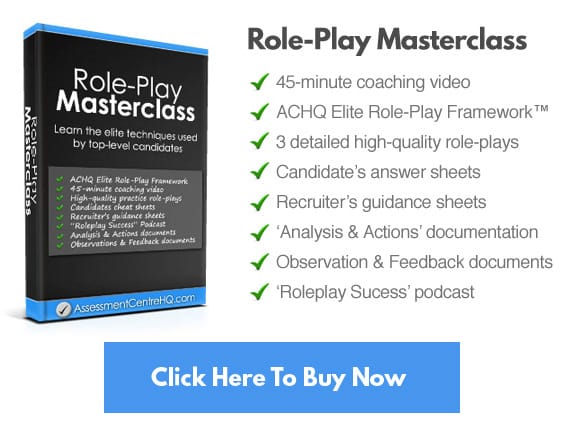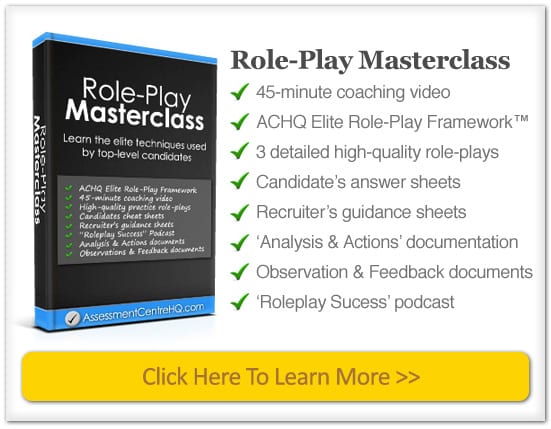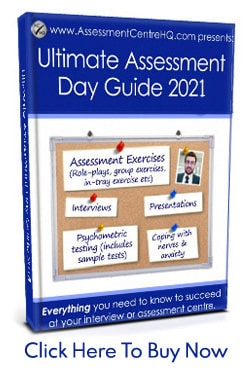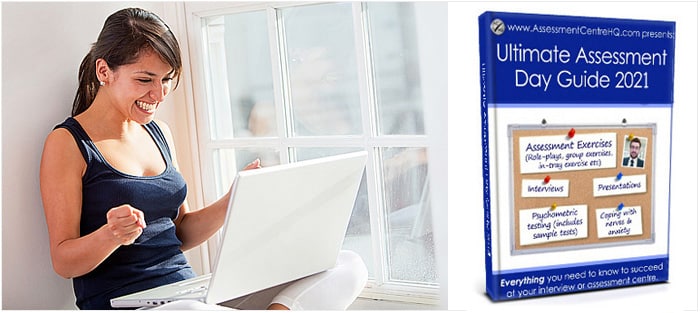Acing Role-Play Interviews: 7 Steps for Guaranteed Success
An interview or assessment centre role-play can be an excruciating experience, but these business simulations are an important part of almost every major employer’s recruitment process. Let’s look at how to shine in a role-play.

What’s in This Guide?
- You will learn the 7 Steps To Role-Play Success.
- You will see two example role-play exercises.
- You will find a video that shows you what employers want to see during your role-play.
Useful Starting-Point Resources
- You can listen to our podcast on role-play exercises success here.
- You can practise role-plays and learn a proven framework to pass ANY role-play in our Role-Play Masterclass.
- You can get hold of a full suite of interview preparation tools here.

What Is a Role-Play Exercise?
Role-play exercises are an assessment activity in which candidates act out an imaginary work scenario that closely mirrors real-life situations that could occur in the job they have applied for.
What Happens During a Role-Play Exercise?
Role-play exercises follow a fairly standard format:
1) You will be given a briefing document that outlines the scenario and your objectives. You will be given 20-30 minutes to prepare.
2) You will then begin the role-play exercises. (Usually with one of the assessors. Often the assessor will be the line manager for one of the roles that are being recruited.)
3) At the end of the role-play exercises, you will be scored on your performance, and that feedback will be factored into the cumulative results of the interview/assessment centre.
Obviously, the context of your role-play brief will vary according to your industry, but the skeleton structure of role-plays tends to remain the same.
Before we look at a real-world example and move on to the ‘7 Steps To Role-Play Success’, let’s take a moment to get an employer’s view.
What Do Employers Want to See During a Role-Play Exercise?
To give you a clearer idea of what to expect, let’s now look at 2 real-world examples.
Here are two simple example briefs that are often used by large corporate recruiters:
Example Role-Play Exercise 1 – The Angry Customer
You are the sales manager of a small firm. You receive a telephone call from an angry customer who bought a home security system from your company but is not happy with it. They are now threatening to take their story to a consumer watchdog and to the trading standards ombudsman. Your objective is to resolve the issue with the minimum damage to the company (both financially & in terms of its reputation). Plan your response and prepare to call the customer.
Example Role-Play Exercise 2 – Internal Negotiation
You are a team member. The other role player is your manager. You have worked for this company for 4 years, having worked for your Manager for the last 2 years. The work is very enjoyable; however, you get very little development time from the boss, and you are very keen to get on. The manager does the annual appraisal every February with you. Lots of promises are made; however, nothing seems to get done. There’s always an excuse.
Samantha, who does a similar job for a different boss, always seems to get plenty of time with him – reviewing performance, action planning, different projects, extra responsibility. She’s even spent some time in another part of the organisation for a couple of weeks on secondment.
You are determined to talk to your manager about this. An opportunity has just cropped up to sit down with them. Your task is to influence your manager to give you more time to develop you. Make sure you get a firm commitment such as the first ‘coaching’ session put in the diary.
These are very simple examples of two of the most common role-play scenarios. For highly-detailed practice role-plays and to learn elite role-play techniques you should take a look at the Role-Play Masterclass.
The 7 Steps to Role-Play Success
1) Read the Brief Carefully. Read the Brief Again.
This is absolutely crucial as any misconceptions or misunderstandings that you make as you rush to begin preparing can undermine all your subsequent efforts in this exercise. The above example role-plays are both quite simple, but the role-plays used for a senior recruitment process can be extremely demanding and complicated.
Fully understand what is expected of you during this exercise. What role are you being asked to assume? Be absolutely clear on what you are being asked to do before you attempt it.
Be sure you fully understand the brief before you begin to prepare. If necessary, ask one of the assessors to clarify. (Some points are deliberately ambiguous, so only ask if you are sure it is not something obvious.)
2) Prepare a List of Open-Ended Questions.
There is always lots of information that are not included in the brief and it is your job to uncover and address them. Questions that start like this are worth spending time on:
-
- “tell me about…”
- “can you expand on……”
- “could you talk to me about….”
Why are these questions so valuable? They give you the most important thing you are seeking in this exercise: more information and clarity. In most role-playing exercises, there are often lots of relevant and important details that are NOT included in the brief. Some details are deliberately omitted as this ensures the role-play has headroom to develop and also allows the assessors to see if the candidate can think on their feet.
.
Stop worrying! Download a 12-step assessment day cheatsheet & be perfectly prepared.
Click here to download your copy
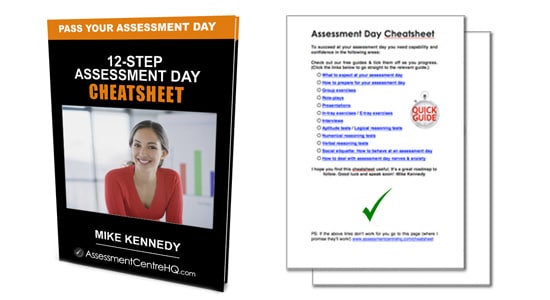
.
3) Prepare Your ‘Bookends’
Bookends are pre-prepared opening and closing statements. Having a pre-planned opening statement (just a few sentences) will help you settle down and relax into the exercise and also ensure you make a confident first impression on the assessor.
Similarly, a strong closing statement will wrap things up well and leave a favourable lasting impression on you.
Spend a few moments during your prep time to create these. Try and commit them to memory. If they are too long or complicated to remember then write them down in large letters (so you can read them at a glance). Bookends add a welcome element of professional sheen to your performance, so do not overlook them.
4) Prepare a Skeleton Structure, but Keep Everything Flexible
Having a clear plan before you begin the role-play exercise is essential but it is equally as important that the activity unfolds as naturally as possible, so do not formulate a rigid plan and expect things to pan out exactly as you have written on your piece(s) of paper.
The conversation should be allowed to flow wherever it needs to go (this is one of the key indicators of a role-play that is going well).
Why is flexibility so important? Because your rigid plan could go out of the window at a moment’s notice if the assessor drops a curve ball into the role-play exercise (which they can and often will do – especially if you are doing well, just to see how you react).
One of the assessors aims is to gauge how you react to unexpected circumstances, so keep things natural and relaxed and you will greatly increase your chances of reacting well.
5) Have Just 1 Piece of Paper on Your Lap/Table
This may sound petty but it is a very practical point: Do not have an impenetrable mass of prep and notes all over your lap or a scribbled piece of A4 with notes covering every inch of space. Just have bullet points written in a large size (i.e., easy to read, even when you’re nervous).
6) Practise, Practise, Practise
Nothing will improve your performance on the day more than familiarity with the exercise. It will improve your key competencies and also help you stay relaxed.
You can practise detailed role-play exercises and watch a 45-minute coaching video that walks you through your copy of the ACHQ Elite Role-Play Performance Framework™ in the Role-Play Masterclass.
7) Be Relaxed, Natural, and Confident
This is easy to say and difficult to do, but it is vital to your success. Read this article “How To Deal With Nerves & Anxiety” to learn some effective techniques to reduce any last-minute panic. Remember you can get hold of a full suite of interview preparation tools here.
- Do you have to take a numerical reasoning test or a verbal reasoning test? If so you may want to check out the aptitude tests section of the site.
- You can find practice tests and tons of free advice on every other type of ‘reasoning test’ too: numerical, verbal, abstract, logical, inductive, diagrammatic, spatial, mechanical comprehension, UKCAT, and Watson-Glaser tests.
- Worried about your role play assessment day? Maybe you are worried about performing a presentation or preparing for an interview or group exercise or in-tray exercise?
- Perhaps you would like some guidance on how to deal with nerves & anxiety at your interview?
Final Thoughts
Role-play can be nerve-wracking, but with enough preparation, you will be able to impress your assessor and let them see that you are competent and fit for the job position you want. Like in any endeavor worth pursuing, effort and dedication are crucial to your success.
Turbocharge your employability NOW
Get your copy of our Ultimate Assessment Day & Interview Guide here. It's packed with tips, tricks and insider-secrets to help you succeed.
.
© Copyright AssessmentCentreHQ - All Rights Reserved
.
FAQs
1. What Is Role-Play in an Assessment Center?
Role play is a common assessment center activity. It usually involves candidates being given a scenario and asked to role-play it out. This can be with another candidate or with an assessor. Role play is used to assess candidates’ skills such as communication skills, problem-solving skills, and teamwork.
2. How Do You Pass the Role to Play in an Assessment Center?
The best way to pass role play in an assessment center may vary depending on the specific role you are being assessed for. However, some tips on how to perform well in role play exercises include being prepared, trying to remain calm and focused, controlling your personal feelings that could lead to anger, and being respectful of your interviewer.
3. How Do You Assess Role-Playing Activities?
There are a few things that I look for when assessing role-playing activities. The first is whether or not students are able to understand and use the language appropriately. Another thing that I look for is whether or not students are able to create and maintain a character and stay in character. Finally, I also assess how well students are able to interact with each other in a role playing activity.
4. How Do You Interview a Role Play?
The key to successful interview role play is to prepare ahead of time. Make sure you know the company’s values and what they’re looking for in a candidate. Practice your answers to common interview questions, and be prepared to answer questions about your experience and skills. When you’re in the interview, stay positive and be yourself. If you can, try to stay relaxed and have fun with the role play.
5. How Do You Prepare for a Role-Play Interview?
To prepare for a role-play interview, some people recommend role-playing interviews with a friend, while others suggest practicing in front of a mirror. It is important to know what your weaknesses are and be prepared to answer common interview questions. You should also familiarize yourself with the company’s culture and the role you are interviewing for.
Recommended Reading


